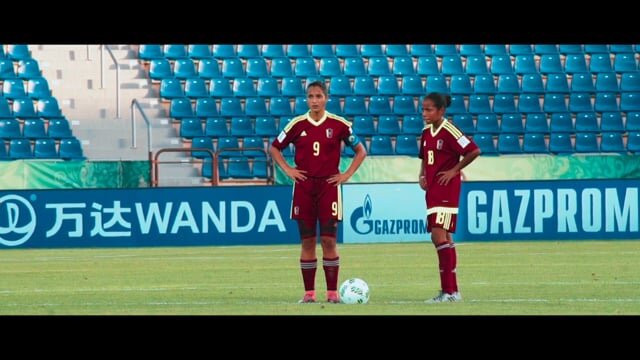They Call Us Warriors: True tale of Venezuela's 2016 Women's Under-17 football is an underdog story with geopolitics
Rating: B
Sports fans, deprived of live television events, have been flocking to the two-part Netflix basketball documentary series, The Last Dance, focusing on Michael Jordan's final season with the Chicago Bulls.
But for a true underdog sports story, with a feminine and geopolitical angle. it's worth checking out They Call Us Warriors (available on iTunes Canada), the story of the 2016 Venezuelan Womens under-17 football team, which seized the country's imagination when it won the 2016 South American championship and then participated in the World Cup in Jordan.
Members of Venezuela’s teen team that went all the way to the Under-17 World Cup
The film was made by three young Caracas directors - Edwin Corona Ramos, Jennifer Socorro and David Alonso (who died in a car accident before the film was released) - who previously had worked mostly in wedding videos. The documentary is a case of a good sports story, told without adequate context to make it a great one.
The opening scenes, from sportscasts, show the team winning the South American championship before a stadium filled with more than 40,000 fans, featuring a familiar amped-up stream of montages, slo-mo action scenes and hoarse-voiced announcers, bursting with patriotism: "They bring out the best in us, whatever we are going through!." - "They remind us that nothing is impossible!" - "They represent more than 30-million Venezuelans.".
Between the opening scenes, and the climactic World Cup bid, the film follows the team-mates over three months of training. It focuses on a handful of players, including top-scorer Deyna Castellanos (a scholarship student at Florida State who has since turned pro), and her star team-mate Daniuska Rodríguez, who comes from a flooded village, and who suffers a debilitating fracture at a key moment.
Another player, Sandra Luzardo recalls, as a child, playing on boys' teams, while her mother pushed her toward a more conventional way out of poverty, beauty pageants. In the end, we learn that the internatoinal profile of the Venezuelan women's football team created a surge in enrolment in women's soccer.
Without directly addressing the economic collapse and political violence in Venezuela in the past decade, the filmmakers introduce us to the shocking levels of poverty the girls come from, sometimes with families living in zinc-walled shanties or in flooded out towns. Panamian-born coach, Kenneth Zseremata, who moved to Venezuela eight years ago to build the team, speaks of players calling him to say they have nothing to eat, and of how he buys toothpaste and deodorant for them on the road.
What do the people on either side of the political divide think of this? How does the government use the girls’ team’s success? (Not included in the doc is the secretary of sports statement that the team’s success was “thanks to our investments … because this is a priority in our politics.”) Presumably, a documentary team from outside of the country might dig deeper to see what the team signifies to different kinds of Venezuelans. Instead, we have repeated scenes of the girls, families and coaches, repeating variations of a mantra: "We are here for our families; we are here for our country.”
They Call Us Warriors. Directed by Edwin Corona Ramos, Jennifer Socorro and David Alonso. They Call Us Warriors is available to rent or buy on iTunes Canada.


